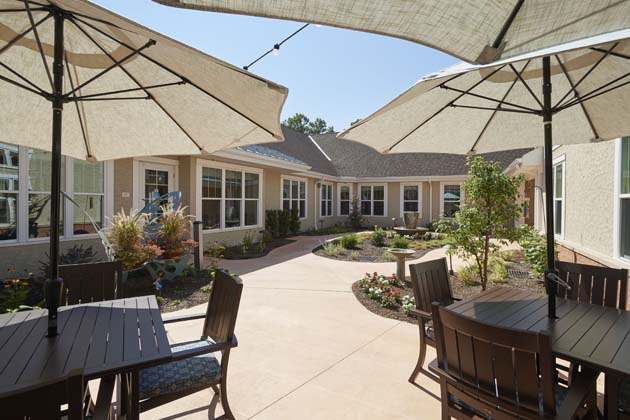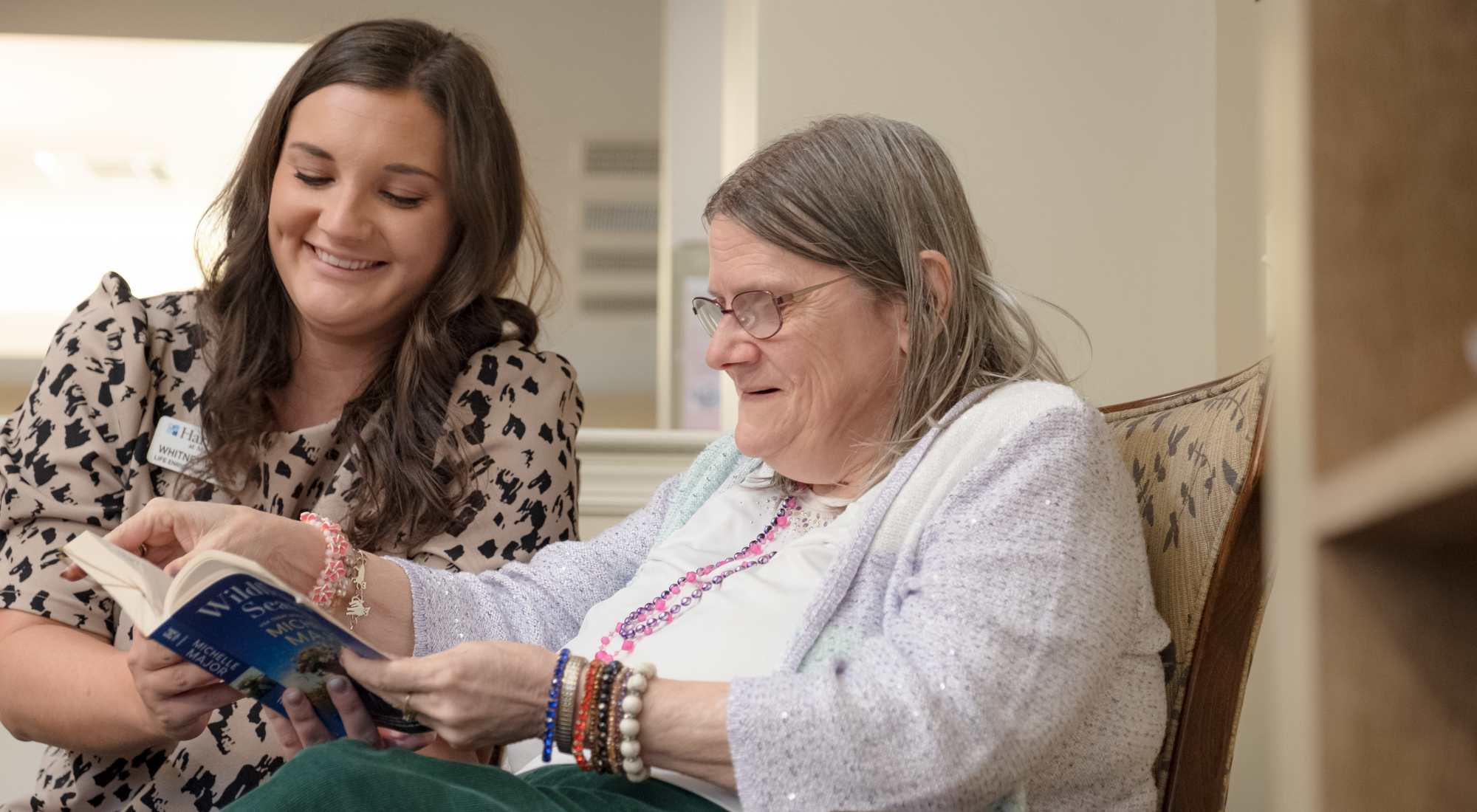Everything About Memory Treatment Services: Why Small Memory Care Residences Are a Terrific Selection
Memory treatment solutions play a vital function in supporting people with Alzheimer's and mental deterioration. Small memory treatment homes stand out for their tailored approach and intimate setup. With lower staff-to-resident ratios, these homes foster more powerful connections and tailored treatment. Citizens take advantage of enhanced social communications and a safe environment. As family members check out options, recognizing the one-of-a-kind advantages of little memory care homes becomes essential. What variables should be taken into consideration when choosing the best home?
Comprehending Memory Treatment Provider
While numerous may recognize with general senior treatment choices, recognizing memory treatment solutions is necessary for family members encountering the obstacles of cognitive decline. Memory treatment specifically satisfies individuals with conditions such as Alzheimer's illness and various other forms of dementia. These services offer an organized atmosphere that concentrates on improving the lifestyle for citizens through specialized care and support.Memory care facilities are designed to guarantee safety and safety and security, frequently including safeguarded settings to avoid straying. Trained employee are available around the clock to assist with day-to-day tasks, medicine administration, and individual treatment. Furthermore, memory treatment programs typically include cognitive stimulation tasks, customized to engage citizens and promote psychological well-being. Family members can benefit from comprehending these services, as they make it possible for educated choices regarding their liked ones' care, making sure that their certain demands and choices are addressed in a supportive and caring manner.
The Advantages of Little Memory Care Homes
Tiny memory treatment homes offer distinct benefits that can greatly enhance the high quality of life for residents with cognitive impairments. One significant benefit is the intimate atmosphere, which enables for individualized interactions among team and citizens. This smaller sized setup cultivates significant relationships, decreasing feelings of isolation and stress and anxiety frequently experienced by individuals with memory issues.Additionally, the reduced staff-to-resident proportion in tiny memory treatment homes enables caregivers to give even more conscientious supervision and assistance. This strategy not only improves security however likewise advertises a complacency for the residents.Moreover, small memory care homes can adapt quickly to the unique requirements and preferences of each local, permitting a more homey atmosphere. Such a setting can encourage social engagement and involvement in activities, inevitably enhancing the everyday experiences of those dealing with cognitive problems.
Personalized Care Plans for Homeowners
Personalized treatment strategies are important in memory care homes, as they cater to the one-of-a-kind needs and preferences of each homeowner. These strategies begin with comprehensive evaluations carried out by proficient specialists, who review cognitive abilities, medical history, and individual interests. This tailored strategy warranties that care is not only reliable however additionally considerate of each person's dignity and autonomy.Moreover, personalized care strategies are flexible, permitting modifications as residents' requirements develop gradually. This flexibility promotes a feeling of safety and familiarity, which is crucial for individuals dealing with memory challenges. Caretakers are trained to implement these strategies consistently, supplying assistance that straightens with the residents' regimens and preferences.Ultimately, personalized treatment plans improve the lifestyle for homeowners by advertising involvement, health, and freedom, making them a fundamental element of memory treatment solutions in tiny memory treatment homes.
Creating a Home-Like Setting
Producing a home-like atmosphere is vital for promoting comfort and experience in memory care settings, as it greatly influences locals' psychological wellness. Small memory treatment homes commonly prioritize customized touches, such as cozy color combinations, family photos, and acquainted furniture arrangements, which aid locals feel more comfortable. Including aspects similar to a typical home, like comfortable living spaces and public areas, motivates a feeling of belonging.Moreover, utilizing natural light and outside spaces can enhance the environment, advertising relaxation and harmony. Team member play a considerable duty in maintaining this environment by involving with locals in a caring fashion, treating them like family. Regular activities, such as food preparation or gardening, can additionally add to a home-like feel, offering chances for citizens to join purposeful experiences. On the whole, creating a nurturing atmosphere sustains cognitive feature and emotional security, making it an important element of memory care solutions.
Enhanced Social Communication and Community
Enhanced social communication and neighborhood are essential elements of memory treatment solutions. By cultivating customized social interaction and developing a family-like atmosphere, these services advertise purposeful links amongst homeowners. Team activities and events better encourage engagement, helping people feel much more consisted of and sustained.
Personalized Social Engagement
While social interaction is crucial for overall health, several people with memory impairments frequently have a hard time to engage meaningfully with others. Personalized social engagement in memory care homes addresses this obstacle by developing customized tasks that accommodate citizens' one-of-a-kind passions and capabilities. By concentrating on individual preferences, caregivers can foster connections that resonate deeply with everyone. Activities such as art treatment, songs sessions, and guided conversations promote cognitive stimulation and emotional expression. In addition, little group settings encourage sociability and enable more intimate communications, enhancing feelings of belonging. This method not only battles sensations of isolation but additionally encourages citizens to maintain a sense of identity, ultimately adding to improved psychological health and top quality of life.
Family-like Environment
In a memory care setup, promoting a family-like atmosphere greatly enhances social communication and constructs a sense of community amongst locals. Smaller memory treatment homes frequently focus on intimate environments, allowing residents to create closer connections with each other and personnel. This nurturing atmosphere advertises trust, which is necessary for people with memory problems. Homeowners are most likely to talk and share experiences, producing an encouraging network that minimizes sensations of isolation. The knowledge of shared rooms and routines click to read more adds to a sense of belonging, better encouraging social interaction (personalized memory care). In such setups, emotional bonds grow, causing improved total well-being her response and a better of life for residents as they browse their everyday experiences with each other
Team Activities and Events

Safety and Safety And Security Features in Little Houses
Lots of tiny homes made for memory treatment incorporate vital security and safety functions to guarantee the well-being of residents. These homes usually make use of safe entrance and leave factors to protect against straying, an usual worry among people with memory disabilities. Additionally, security systems and alarm system devices improve tracking, guaranteeing that staff can promptly react to any kind of uncommon activities.Interior layouts are tailored for safety and security, with lessened risks such as sharp corners and clutter-free paths. Handrails and non-slip flooring are usually installed to minimize the risk of falls. Staff participants are learnt emergency situation protocols, guaranteeing they are prepared for various situations.Moreover, individualized treatment plans might include assessment of specific security needs, giving customized options for each homeowner. In general, these security and safety and security functions create a nurturing atmosphere where homeowners can prosper while maintaining their self-respect and independence.
Just how to Select the Right Memory Care Home
How can households guarantee they choose one of the most appropriate memory treatment home for their loved ones? The choice requires cautious consideration of a number of factors. Initially, families must evaluate the a knockout post facility's personnel qualifications and training, making sure that caretakers are experienced in managing memory-related problems. Next, it's essential to analyze the home's environment, concentrating on safety and security features and whether it cultivates a sense of neighborhood and belonging. Checking out the center can supply understanding into day-to-day tasks and the social environment, which are vital for mental excitement and emotional health. Furthermore, households must make inquiries regarding the treatment strategies used, guaranteeing they are customized to specific requirements. Ultimately, thinking about the home's area and ease of access for family sees can add to a smoother shift. By dealing with these elements, families can make an informed choice that prioritizes their enjoyed one's comfort and lifestyle in a memory treatment setup.
Often Asked Inquiries
What Qualifications Should Personnel Members in Memory Care Residences Have?
Team member in memory treatment homes need to possess pertinent accreditations, experience in mental deterioration treatment, solid communication skills, and empathy. Continuous training in behavior administration and restorative interventions improves their ability to support citizens properly.
How Do Memory Treatment Solutions Differ From Traditional Assisted Living?
Memory care services concentrate especially on individuals with memory problems, providing specific assistance and structured environments. In comparison, conventional assisted living supplies general support with everyday tasks, doing not have the customized strategy essential for those with cognitive obstacles.
What Sorts of Activities Are Supplied in Memory Treatment Homes?
Memory care homes commonly supply a range of activities developed to involve locals. Usual options include art treatment, songs sessions, cognitive games, physical workouts, horticulture, and get-togethers, all focused on boosting wellness and cognitive feature.
Can Residents Bring Their Own Personal Belongings to Memory Treatment Homes?
Citizens can generally bring their very own valuables to memory care homes, allowing them to personalize their space - personalized memory care. This technique assists develop an acquainted environment, promoting comfort and a feeling of identification for the people

Just How Are Family Members Participants Associated With the Treatment Refine?
Relative play an essential duty in the treatment procedure, usually joining decision-making, attending care meetings, and giving psychological assistance. Their participation cultivates a joint environment, enhancing the homeowner's total well-being and lifestyle. While many might be familiar with basic senior care options, understanding memory care services is essential for households encountering the obstacles of cognitive decline. These solutions offer a structured environment that focuses on improving the high quality of life for homeowners via specialized care and support.Memory care facilities are created to assure security and security, often featuring protected environments to stop straying. Personalized care plans are vital in memory care homes, as they provide to the unique demands and preferences of each resident. Team members in memory treatment homes must have relevant certifications, experience in mental deterioration treatment, strong interaction skills, and empathy. Memory care services focus especially on people with memory disabilities, offering specialized assistance and organized settings.